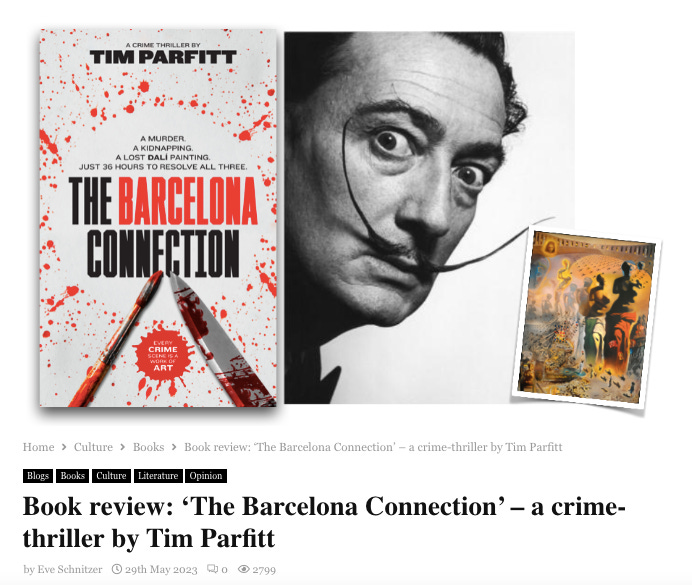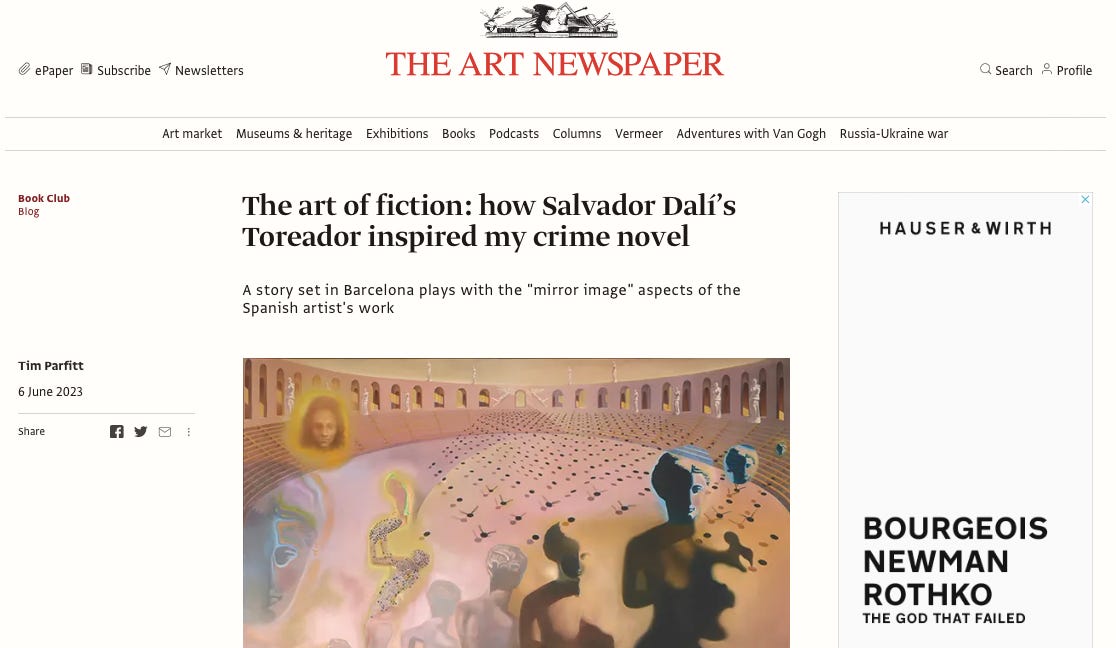Soon after 1 October 2017, while reporting on the fallout of the independence referendum here in Catalonia - banned by the central government of Mariano Rajoy - I soon realised that the Catalans were never going to achieve their aim, anyway - not because of the crackdown from Madrid, which actually helped their cause, but because of the squabbles between their own political groups.
Despite all wanting the same thing (independence), the two main pro-independence parties - Esquerra Republicana (ERC) and Junts per Catalunya (JxCat) - couldn’t agree on how to achieve it, and they still can’t (not that they’ll ever achieve it, anyway).
There was a moment - a very brief moment - in the build up to 1 October 2017, and on the day itself, the day of the illegal vote - when it looked like they might achieve it, or at least achieve ‘something’. Building up to it during September that year, there’d been two million Catalans on the streets clamouring for it. On the day itself Catalonia was on the front page and screen of every news outlet in the world, with Angela Merkel reportedly phoning Rajoy and telling him to stop the Spanish police beating up innocent voters (although he later denied the call ever took place).
The day itself certainly put Catalonia on the map, but the Catalan pro-indy parties had no idea how to follow through on anything - and I don’t think they ever had a plan in the first place. They can’t even agree on how to govern in a coalition in Catalonia right now, so how they could ever achieve independence and then govern an independent Catalonia is anyone’s guess.
Fast-forward six years. During those six years we’ve had the trials in Madrid, the ‘self-imposed exile’ (or those who ‘fled’ to Brussels, you choose), the imprisonments and the pardons.
Now we have a possible ‘amnesty bill’ for all Catalan pro-independence figures still facing legal action following that 2017 referendum - and the Catalan parties still can’t agree on whether to accept it.
The background to it all, of course, is that Pedro Sánchez is seeking their support in order to be officially voted in as Prime Minister again. If he doesn’t achieve that by 27 November, then Spain will hold yet another general election, possibly in mid-January. In exchange for their support, the ERC and JxCat have demanded the amnesty, fiercely opposed by Spain’s right-wing and far-right parties. I’ve given my own view about the issue of granting amnesty or not in Letter from Spain #21 and #25 and so there’s no need to repeat it all here.
The ERC group has already agreed to the draft terms of the amnesty bill proposed by the socialist (PSOE) party of Sánchez. In addition, other requests in their ‘Dear Santa’ letter - such as the transfer of the Catalan Rodalies commuter rail network so that it is managed and controlled from Catalonia and not Madrid - have also been granted, as well as writing off some €15 billion of Catalan debt.
Meanwhile, Carles Puigdemont - head of the JxCat party and who was the Catalan president during the illegal referendum and then ‘fled’ to Brussels a few days later (where he is now an MEP) - is still dragging his feet on whether to accept the amnesty bill proposal, when he was the one who had demanded it in the first place.
Why? When he himself would be free to return to Spain from Brussels under the amnesty terms …
Is his reluctance to sign an agreement with the PSOE still linked to the inane power struggle between his JxCat party and the ERC in Catalonia? It seems it is. According to journalist Enric Juliana writing in La Vanguardia, Puigdemont wants to ‘impose a narrative’ about the agreement that is different than that of the ERC’s, and so ‘the last word must be his’.
Personally, I think he’s pushing his luck.
I used to feel much more sympathetic to the Catalan pro-independence cause, but I’ve seen and witnessed the anger and frustration of what’s happened in the last six years on many Catalan friends, and they feel not only let down but totally cheated. One particular friend, a stand-up comedian, uses laughter to get over it. Part of his routine relates how he poured himself a beer to celebrate Puigdemont declaring independence on 27 October 2017, but before the glass had even touched his lips, Catalonia was no longer independent.
Independence lasted 56 seconds.
The Barcelona Connection - Research
The Port Olímpic and particularly the Hotel Arts feature quite a bit in The Barcelona Connection (making their first appearance from Chapter 36) - with the hotel itself being where many of the fictional G20 dignitaries are staying, including the US delegation.
Just before the 1992 Barcelona Olympics, I practically lived at the Hotel Arts midweek - which I mention in A Load of Bull. I was in charge of the Barcelona office of Condé Nast at the time, and instead of commuting backwards and forwards from the Madrid head office, we pulled off an ‘intercambio’ with the hotel - which means advertising (or I think it was ‘editorially’-designed advertising) in exchange for accommodation. This is from A Load of Bull:
I asked the office in Barcelona to find somewhere like my original Madrid apartamento in the Centro Colón. But instead of a greasy turquoise apartamento, they found me the sumptuous Hotel Arts in the Olympic port, forty-four storeys high with panoramic views on all sides over the city and Mediterranean. It didn’t take us long to find ways that Vogue and the hotel could work together, and I virtually moved in during the weekdays, lock, stock and banderilla. Here, in a huge bath-robe, in my pastel-coloured penthouse-suite with marble bathrooms (yes, plural) on the thirty-something floor, if I wanted the Bang & Olufsen CD-player to open I simply clapped my hands. I’d never seen something so sophisticated - and I don’t think Spain had, either. In fact we’d come a long way, Spain and I, since the days of my crackling radio-casette player in the Colón.
I’ve been lucky to have stayed at the Arts on a few other occasions over the years - and so when Mitch Gibson takes in ‘the panoramic views of Barcelona and the Mediterranean Sea from a conference room on the forty-second floor’ of the hotel in Chapter 36 of The Barcelona Connection, I know exactly where he’s standing, with ‘the top three floors of the hotel transformed into the US HQ for G20 week’ …
The hotel’s terrace restaurant also appears in a later chapter with characters at a cocktail party there, but I’ll write about that in a future post …
Previous links to my research notes are here:
Chapter 29 in Letter from Spain #28 (Nîmes to Barcelona and tollgates)
Chapters 28 and 32 in Letter from Spain #27 (Pedralbes and Jaume, the Marquès de Guíxols)
Chapter 26 in Letter from Spain #26 (pijos and Beltrán Gómez de Longoria).
Chapter 25 (again) in Letter from Spain #25 (Benjamin’s thoughts on Púbol, Figueres and Port Lligat-Cadaqués).
Chapter 25 in Letter from Spain #23 (Benjamin and Elena on the Passeig Marítim).
Chapter 22 & Chapter 24 in Letter from Spain #22 (Plaça Sant Jaume & Nîmes).
Chapter 21 in Letter from Spain #21 (the Museu Nacional d’Art de Catalunya - MNAC).
Chapter 18 in Letter from Spain #20 (Nîmes).
Chapter 16 in Letter from Spain #19 (Marta Soler visiting the offices of La Vanguardia).
Chapter 15 in Letter from Spain #18 (Sants, Les Corts and the Plaça de la Concòrdia).
Chapter 14 in Letter from Spain #17 (introducing Inspector Vizcaya and Marta Soler).
Chapter 13 in Letter from Spain #16 (the painting - the possible study of The Hallucinogenic Toreador by Salvador Dalí).
Chapters 10 and 12 in Letter from Spain #15 (Isabel Bosch and Lieutenant Trias).
Chapters 8 and 11 in Letter from Spain #14 (Benjamin at Girona Airport and finding the Marqueses’ home in La Bisbal).
Chapter 7 in Letter from Spain#12 (Séverin and Jürgen).
Chapter 5 in Letter from Spain#11 (Elena in Girona).
Chapters 3-4 in Letter from Spain#9 (Marcos Constantinos in Hampstead, plus Benjamin at the UEA & Stansted).
Chapter 2 in Letter from Spain#8 (the home of the Marqueses de Guíxols, not far from La Bisbal d’Empordà).
Chapter 1 in Letter from Spain#7 (Benjamin waking up at the service station).
The Barcelona Connection - Reviews, News & Events
Links to reviews & articles
A review of The Barcelona Connection by Michael Eaude has been published in the October edition of Catalonia Today.
‘Short, fast-moving scenes and the deft joining of two completely different plots … the novel is not just breathlessly rapid and action-packed, but overflows with humour and satire.’
‘The excellent plotting, the local knowledge, the surreal humour, the political satire and the speed of events … it’s an admirable and very readable crime novel.’
Here’s the link for a review of The Barcelona Connection by Dominic Begg that came out in La Revista, a publication of the British-Spanish Society.
‘The Barcelona Connection is a fast-moving page-turner with a helter-skelter plot.’
‘The background to this thriller is realistic and familiar to those who know Barcelona well. It’s a world of cynical, ambitious politicians; civil servants promoted via enchufe; friction between Spanish and Catalan investigators; disruptive anti-capitalist activists; bumbling US dignitaries and security guards; the continuing influence of old supporters of Franco; the soulless 21st century, exemplified by apartment hotels seemingly without human staff-members …’
Here’s a link to a review of the book by Eve Schnitzer published by the Spain in English online newspaper.
‘Tim Parfitt very cleverly weaves together two parallel though quite different stories, set against the background of a contemporary Barcelona that is even busier than usual with major international meetings.’
‘Two plot lines interweave, with some highly ironic as well as suspenseful results … this book has a lot to offer the reader, from pure entertainment to solid information and, possibly, a fuller understanding of the complexities of Spain and Catalonia in particular.’
Here’s the link to an article I was asked to write for The Art Newspaper about my research on Salvador Dalí.
You can also click here for the latest reviews on Amazon, as well as on Goodreads and at Barnes & Noble.
The book is available on Amazon or you can also click here to choose where else to order your copy from. It can also be ordered from any bookshop simply by giving the ISBN number: 978-1-7393326-1-7.
You can also click here for the Kindle edition of A Load of Bull - An Englishman’s Adventures in Madrid.
For professional enquiries and foreign rights for The Barcelona Connection, please contact my agent Justyna Rzewuska at the Hanska Literary & Film Agency.







